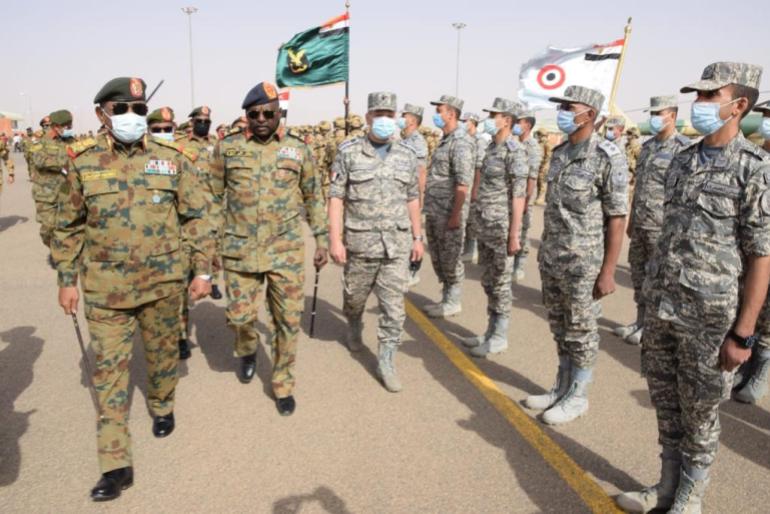Today, Sunday, a new round of negotiations on the Grand Renaissance Dam continues in Kinshasa between Ethiopia, Egypt and Sudan, under the auspices of the Democratic Republic of the Congo, chair of the current session of the African Union, while the Ethiopian president confirmed that her country is moving forward towards the second filling of the dam.
Al-Jazeera correspondent reported that preparatory meetings were held yesterday, Saturday, for experts from Egypt and Ethiopia, separately with the African mediator, while the Sudanese delegation announced the postponement of its meeting until Sunday.
The direct ministerial meetings between the three countries are scheduled to start this afternoon, in the presence of the foreign and irrigation ministers from Sudan, Egypt and Ethiopia, and will conclude tomorrow, Monday.
This round examines the methodology and negotiation mechanisms in preparation for the parties' return to the negotiating table after a hiatus that lasted for several months.
The tour is also scheduled to discuss the Quartet mediation proposal to add the United Nations, the European Union and the United States to the negotiations to be held under the leadership of the African Union, which is proposed by Sudan and Egypt and rejected by Ethiopia.
Hold on to the position
This new round of talks on the Renaissance Dam comes days after President Abdel Fattah al-Sisi’s statements in which he warned against “compromising the Nile of Egypt,” and carried within it the strongest threatening tone to Addis Ababa since the outbreak of the crisis a decade ago, as he said Tuesday, “The waters of the Nile are a red line. We will not allow any prejudice to our water rights, and any prejudice to Egypt's water will have a reaction that threatens the stability of the entire region. "
The Grand Ethiopian Renaissance Dam crisis is exacerbating with the faltering technical negotiations between the three countries, which began about 10 years ago and have been run by the African Union for months.
Addis Ababa insists on the second filling of the dam next July, even if no agreement is reached on it, while Cairo and Khartoum insist on concluding an agreement that guarantees their annual shares of the Nile River water, which amount to 55.5 billion cubic meters and 18.5 billion cubic meters, respectively. .
Sudan also calls for an international quadripartite mediation that includes, in addition to the African Union, the European Union, the United Nations and the United States, and Ethiopia opposes the expansion of the mediation.
The director of the Al-Jazeera office in Khartoum, Al-Muslimi Al-Kabbashi, said that Sudan seeks through the Kinshasa meetings to change the methodology and path of negotiation to break the deadlock that has continued for many months, indicating that Sudan wants to give a greater role to the African Union experts in drafting the final decisions.
He also indicated that the United States and the European Union practically organized talks on the Renaissance Dam, as the US and European envoys recently held long talks in Khartoum.
Ethiopian preparations
In turn, the President of Ethiopia, Sahli Warak Zodi, confirmed, yesterday, Saturday, that her country is making preparations to move forward with the second phase of filling the Grand Ethiopian Renaissance Dam.
In a speech marking the tenth anniversary of the start of the construction of the Grand Ethiopian Renaissance Dam, Zodi added that Addis Ababa was denied the right to develop projects in the Nile River, stressing that the development of the Nile River is a matter of survival for Ethiopia, as it contributes to the provision of surface water resources in the country by two-thirds. .
The President of Ethiopia expressed her belief that the developments in the Nile River will eliminate poverty in the country, and also benefit the downstream countries, and called on neighboring countries to cooperate for a fair and reasonable use of resources.
For his part, Ethiopian Minister of Water and Irrigation Seleshi Bagli said, "The coming months are crucial for the construction of the Renaissance Dam, and work is underway to make the second filling of the dam successful."
Bakli added - in a speech published by the ministry on its website - that the country expects that the Kinshasa meeting will return the path of negotiations to their path and that an agreement acceptable to all will be reached, he said.
Bagli indicated that Ethiopia is making double efforts to produce the first electric power from the Grand Ethiopian Renaissance Dam by next August.
Commanders from the Egyptian and Sudanese army inspect the forces participating in the military maneuvers between the two countries (social networking sites)
Sudanese Egyptian maneuvers
Meanwhile, the activities of military maneuvers called "Nile Eagles 2" will be concluded today, Sunday, between the Sudanese and Egyptian air forces in the city of Meroe, northern Sudan.
The end of the exercises will be witnessed by the Sudanese Chief of Staff, Chief of Staff of the Egyptian Army, and commanders of the two countries' armies.
The commander of the Sudanese Air Force, Issam Koko, confirmed that these joint exercises of the Sudanese and Egyptian air forces come with the participation of ground forces and special forces from the two countries, according to agreements between the two countries to establish them every year.
Coco explained that the exercises aimed at exchanging experiences and enhancing training in the areas of planning and implementation.

